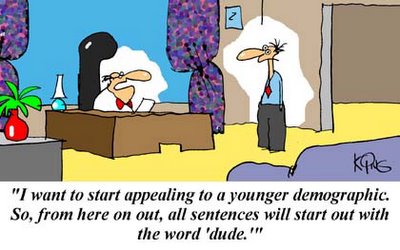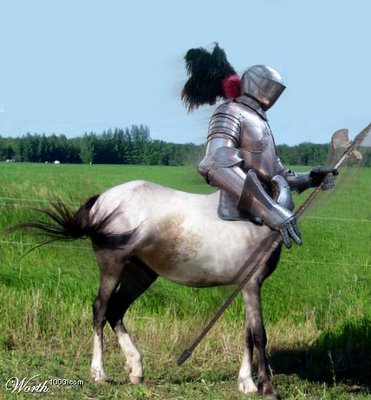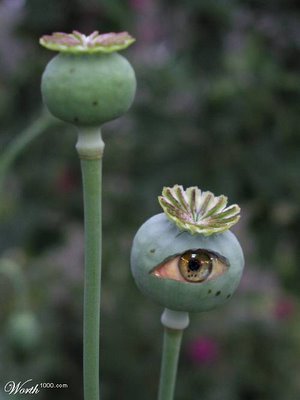We have -
Moved To:
http://professor-howdy.blogspot.com/
The E.Newspaper
By Dr. Howdy, Ph.D.
A.P.E., N.U.T.
************************
Check Out Comments -
Humor + Letters From Readers
Add Something Yourself
************************
Saturday
Christmas Riddle

Who wrote this ancient prophecy???
For unto us a Child is born, Unto us a Son is given; And the
government will be upon His shoulder. And His name will be
called Wonderful, Counselor, Mighty God, Everlasting Father,
Prince of Peace. Of the increase of His government and peace
There will be no end, Upon the throne of David and over His
kingdom, To order it and establish it with judgment and justice
from that time forward, even forever. The zeal of the Lord of
hosts will perform this.
1) Matthew
2) Luke
3) Peter
4) Other
Friday
I'll Be Home For Christmas


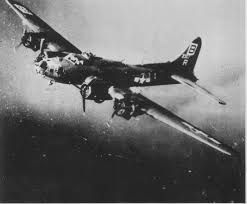
On October 4, 1943, Bing Crosby recorded "I'll Be Home
for Christmas" Within about a month the song hit the music
charts and remained there for eleven weeks. The following
year, the song reached number nineteen on the charts. It
touched a tender place in the hearts of Americans, both
soldiers and civilians, who were then in the depths of
World War II, and it earned Crosby his fifth gold record.
"I'll Be Home for Christmas" became the most requested
song at Christmas U.S.O. shows in both Europe and the
Pacific and Yank, the GI magazine, said Crosby accomplished
more for military morale than anyone else of that era.


You can count on me.
Please have snow and mistletoe
And presents under the tree.

Christmas Eve will find me,
Where the love light gleams.
I'll be home for Christmas,
If only in my dreams.

Christmas Eve will find me,
Where the love light gleams.
I'll be home for Christmas,
If only in my dreams.




Q: Why did the UNC* student eat the candle?
A: He needed a light refreshment.
________
*UNC is the University of North Carolina in Chapel Hill.
Specializing in a wide range of degree programs including:
B.A. A.H.F.(Advanced Hamburger Flipping), A.P.E., N.U.T., B.R.C.
(Bar Room Conversations), etc. Institution was founded in 1898
for sons/daughters of local Chapel Still politicians that were
unable to qualify for the more prestigious institutions of higher
learning such as Duke, Wake Forest, and N.C. State.

Q: Why are UNC students immune to Mad Cow Disease?
A: Because it only attacks the brain.


Two buffalo were standing on the range when a passing tourist said:
"Those are the mangiest, scroungiest, most moth-eaten miserable
beasts I have ever seen."
One of the buffalo turned to the other and said: "I think I just
heard a discouraging word."

Riddles For 12.2.5

1) My step is slow,
the snow's my breath,
I give the ground
a grinding death.
My marching makes
an end to me,
slain by sun or
drowned in sea.
What am I?
2) What comes next in this sequence:
PN BP KT RK _ _
3) Soldiers line up spaced with pride,
Two long rows lined side by side.
One sole unit can decide,
If the rows will unite or divide.
Tell me, tell me, scream it out.
What's the thing I talk about?
4) "Six kings" can be converted into what word?
LEWIS VS. FREUD:
ON GOD, LOVE, SEX, ETC.

Dr. Armand Nicholi have been studying this
question. Nicholi teaches a Harvard course
on Sigmund Freud, the legendary founder of
psychoanalysis, and C.S. Lewis, the celebrated
writer who converted from atheism to Christianity.
The course was originally designed to be about
Freud’s philosophical views, but evolved into
a comparison of Freud and Lewis when many
of Nicholi’s students expressed their disagreement
with Freud and asked for some balance.
Why Lewis? First, to counter Freud’s adamant
unbelief obviously required someone whose faith
in God was just as deeply ingrained. More, it required
someone who was articulate in defending that faith.
C.S. Lewis is regarded by a growing number of people
as the most eloquent spokesman for Christianity in the
last century. And though he was 42 years younger than
Freud and probably never met him, Lewis knew Freud’s
views well — he had shared them for roughly half his life.

Dear Friends,
There is now no condemnation for those
who are in Christ Jesus, because through
Christ Jesus the law of the Spirit of life in
Christ has set me free from the law of sin
& death.
Your Devoted Friend,
Howdy



R8
Getting Rid of What You've Hung Onto So Long

Our friend Joy has become a bit of an expert on moving.
Her husband is a career Air Force officer, and that means
seeing a lot of different places, having a lot of different
addresses, and seeing a lot of moving vans in your life.
We were talking the other day about their last move and
what she considered one of the greatest gifts she's ever
been given. It didn't have beautiful wrapping paper or
bows on it. In fact, it was a dumpster! That might not
sound all that exciting to you, but it was to her! She
and her family had so much stuff to move, and every -
thing they could get rid of, they didn't have to move.
Someone said to her, "I've got this dumpster I'd like
to loan to you for your move." Joy said she was over -
joyed! She said there was something so exciting about
the first thud of the first thing they threw into that dump -
ster. Then it was all about lots of thuds as they threw
away mountains of stuff. They couldn't wait to go get more.

Thursday

A UNC prof goes into a doctor's office.
Prof: Doctor, I don't know what's wrong with me.
Doctor: Well, tell me your symptoms.
Prof: Well, everything hurts. When I touch my nose...
it hurts (touching nose), when I touch my leg... it hurts
(touching leg), when I touch my arm... it hurts (touching
arm)... It just hurts everywhere!
Doctor: Your finger's broken.

From Archives -
One of Howdy's Favorites
Two UNC grads are walking through the woods and come
across this big deep hole.
"Wow...that looks deep."
"Sure does... toss a few pebbles in there and see how deep it is."
They pick up a few pebbles and throw them in and wait... no noise.
"WOW. That is REALLY deep... here.. throw one of these great
big rocks down there. Those should make a noise."
They pick up a couple football-sized rocks and toss them into
the hole and wait... and wait. Nothing.
They look at each other in amazement. One gets a determined look
on his face and says, "Hey...over here in the weeds, there's a
railroad tie. Help me carry it over here. When we toss THAT
sucker in, it's GOTTA make some noise."
The two drag the heavy tie over to the hole and heave it in. Not
a sound comes from the hole.
Suddenly, out of the nearby woods, a goat appears, running like
the wind. It rushes toward the two men, then right past them,
running as fast as it's legs will carry it. Suddenly it leaps in
the air and into the hole.
The two men are astonished with what they've just seen...
Then, out of the woods comes a farmer who spots the men and
ambles over. "Hey... you two guys seen my goat out here?"
"You bet we did! Craziest thing I ever seen. It came running
like crazy and just jumped into this hole!"
"Nah", says the farmer, "That couldn't have been MY goat.
My goat was chained to a railroad tie."
OUR NATION'S GODLY HERITAGE
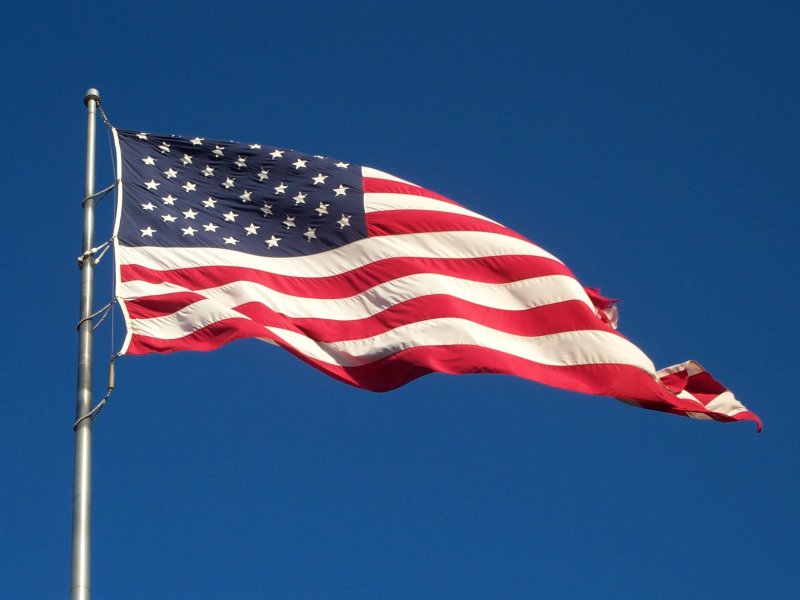
On March 3, 1931, The Star Spangled Banner was adopted
by Congress as our National Anthem. Francis Scott Key
wrote it more than one hundred years earlier, after watching
the fierce Battle of Fort McHenry during the War of 1812.
Many know and appreciate the stirring words to the first
verse of the Anthem, but few are familiar with its inspirational
second verse:

O! thus be it ever when free men shall stand Between their
loved home and the war's desolation; Blest with vict'ry and
peace, may the Heav'n-rescued land Praise the Pow'r that
hath made and preserved us a nation!

Then conquer we must, when our cause it is just; And this
be our motto, "In God is our trust!" And the star spangled
banner in triumph shall wave O'er the land of the free and
the home of the brave!

It is because of this verse that courts allowed to stand the
motto, "In God We Trust" on our nation's currency. Had
it not been in the national anthem, the courts undoubtedly
would have been forced to declare it an unlawful act of the
government to promote religion.




I once had a cross-eyed teacher
who couldn't control her pupils.

Howdy recently ordered a cup of coffee
with no cream at a Chapel Hill restaurant.
The waitress replied, "I'm sorry, you'll
have to have it with no milk because
we're out of cream."

Visual Puns
* * * Great Archives Here - - - - "Music That Howdy Enjoys" Below * * *
December 26 January 02 January 09 January 16 January 23 January 30 February 06 February 13 February 20 February 27 March 06 March 13 March 20 March 27 April 03 April 10 April 17 April 24 May 01 May 08 May 15 May 22 May 29 June 05 June 19 June 26 July 03 July 10 July 17 July 24 July 31 August 07 August 21 August 28 September 04 September 11 September 18 September 25 October 02 October 09 October 16 October 23 October 30 November 06 November 13 November 20 November 27 December 04 December 11 December 18 December 25 January 01 January 08 January 15 January 22 January 29 February 05 February 12 February 19 December 30
